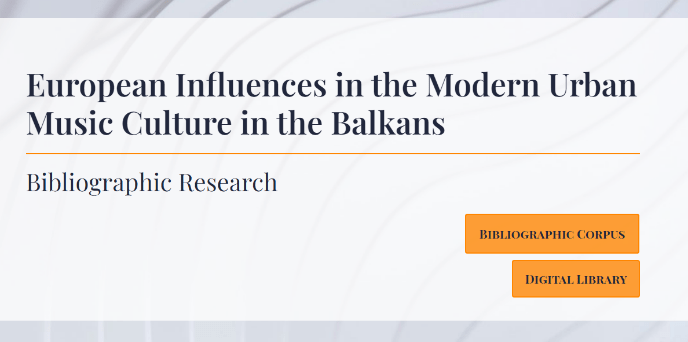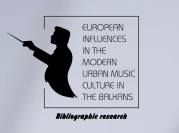
A project, that started in 2020 and was implemented by the Institute of Balkan Studies & Centre of Thracology of the Bulgarian Academy of Sciences (IBSCT-BAS), titled “European influences in the modern urban music culture in the Balkans. Bibliographic research”, made an important step towards the further research and understanding of the social and cultural history, processes of modernization in Balkan societies and history of music.
The main objective of this interdisciplinary project, funded by the Bulgarian National Science Fund (BNSF), was conducting a bibliographic study of European influences in the modern urban music culture in the Balkans. By collecting, systematizing, classifying, and cataloging of documents, a bibliographic corpus, which covers different in type and content materials on the topic, was created. This particular type of research had been missing for years and its advent is a worthy contribution to the academic literature.
The scholarly team was led by Assist. Prof. Dr. Alexandra Milanova and composed of representatives of the IBSCT-BAS, the Bulgarian National Music School “Lubomir Pipkov”, and the Institute of Musicology of the Serbian Academy of Sciences and Arts.
The scarce and insufficient database on the role of music in urban history and its influence in the complex process of modernization of Balkan societies explains the motivation of project participants to focus their attention and efforts on historiographical research on the topic. The team thoroughly and persistently searched for and researched the available literature through the effective use of library, archival and electronic resources and found original and hitherto unknown materials.
The bibliographic corpus created as a result of the project is published on а website with free access. In addition, a significant part of the materials collected during the implementation of this project are digitized, systematized, classified and integrated into national and international e-infrastructures.

The main goal of this interdisciplinary project was to conduct a bibliographic study of European influences in modern Balkan urban music culture. Through the collection, systematization, classification and cataloging of documents, a bibliographic corpus was created, which covers different types and content of materials on the topic. It is published on a specially designed free access website. The bibliographic corpus includes a total of 615 titles: individual and collective monographs, encyclopedias, biographies, memoirs, collections of reports from scientific forums, chapters from books, studies, articles, reports from conferences and seminars and one virtual exhibition. The researched and described materials are in 13 languages (English, Bulgarian, Greek, Spanish, Italian, German, Portuguese, Romanian, Russian, Slovenian, Serbian, Turkish, French). Another important part of the website is the Digital Library, which currently includes 150 titles on the topic of the project, provided for free use in .pdf format.
The bibliographic study of European influences in modern urban music culture in the Balkans will serve as a basis for future research in the field of cultural science and in musicology, that will contribute to increasing the amount of visible scientific output, to supporting research, to stimulating and expanding international academic cooperation. The results of the project activity will also help to increase the public interest in the preservation, promotion and development of national and European cultural heritage.
As Lia Peralta in her article on “How does music affect society?” says, “Music is an essential aspect of all human civilizations, and when people from one culture exchange music with each other, they gain valuable insight into another way of life. Learning how music and social bonding are tied is especially crucial in times of conflict when other lines of communication prove to be challenging. Music, as a cultural right, may aid in the promotion and protection of other human rights. It can help in the healing process, dismantling walls and boundaries, reconciliation, and education. Around the world, music is being used as a vehicle for social change and bringing communities together.”
Music and art are the “spiritual bridges” that connect people from different societies, religions and cultures. Although the impressive project on the European influences in the modern urban music culture in the Balkans was completed in February 2022, the team will continue its work, not only by supplementing the bibliographic corpus and digital library of the site with new titles, but also by trying to build new “academic bridges” with researchers from all over the world.
This article was originally published in Balkans in-site on March 11, 2022.
References
- Institute of Balkan Studies & Centre of Thracology of the Bulgarian Academy of Sciences
- European Influences in the Modern Urban Music Culture in the Balkans. – Bibliographic research. (n.d.) https://euromusicbalk.com/home
- Save The Music Foundation: Education Resources for Children. (2022, January 1). Music Has Shaped Cultures and May Not Be Immediately Apparent. https://www.savethemusic.org